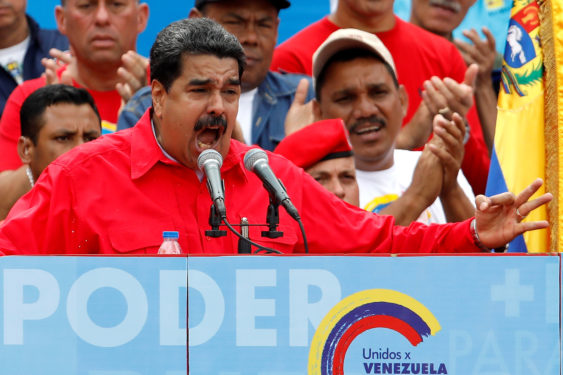By Inés San Martín

ROSARIO, Argentina (Crux) – A day after the bishops of Venezuela declared the new presidency of Nicolas Maduro “illegitimate,” Pope Francis sent a Vatican representative to his inauguration. The successor of the late Hugo Chavez thanked Msgr. George Koovakod for his “bravery” for coming.
Many observers say the apparent contrast isn’t a matter of the Vatican and the bishops being at odds, but rather a classic “good cop, bad cop” diplomatic maneuver.
Maduro took office for the second time Jan. 10 amidst criticism from the international community of snap elections in May. Concerns over legitimacy have led the United States, along with most nations of Latin America and the European Union, to break diplomatic relations with Venezuela.
Visible among the few representatives from other countries was Monsignor Koovakod, a Polish prelate who was appointed as Chargé d’affaires at the Vatican’s Secretary of State last year.
The Venezuelan crisis is not one the Holy See’s diplomatic team looks at from afar: the sostituto, often referred to as the second most important person in the secretariat, comes from this Latin American country, Archbishop Edgar Peña Parra. The secretary of state, Italian Cardinal Pietro Parolin, was handpicked by Pope Francis for the job while he was serving as papal representative in Venezuela.
As Crux previously reported, when the Venezuelan bishops were in Rome last September for their ad-limina visit, the matter of the Holy See acknowledging Maduro as the rightful, democratically elected president was brought up by many in the Vatican, including Pope Francis.
The situation is complex, and no clear decision was reached during the week-long visit. Though the bishops have been clear over the past year about their opposition to the government, several Venezuelan expats consulted by Crux acknowledged they wish the hierarchy would do more. However, they also acknowledged that this could put at risk the activities of the Catholic aid agency Caritas, one of the very few groups still allowed to run soup kitchens and first aid.
According to Elisabetta Pique, a long-time Vatican watcher who writes for one of Argentina’s major newspapers, La Nación, the Venezuelan bishops had the green light from the Holy See to declare Maduro’s regime to be illegitimate and the local episcopacy had been consulted about the pros and cons of sending a representative to Maduro’s swearing in.
Another Case of Vatican’s Realpolitik
This information, together with what Crux has been able to confirm, suggests that despite Maduro’s attempts to put the bishops and Pope Francis on opposite sides, at the end of the day, it’s no more than another case of the Vatican’s realpolitik at play, confirming the Holy See’s intentions never to break diplomatic relations with a country.
The Church’s long-standing tradition of leaving the doors of dialogue and diplomacy open whenever it’s possible does not mean actual support of the local ruling class.
On Jan. 11, the head of the Organizations of American States released a statement saluting Juan Guaidó, president of the National Assembly, as the new president of Venezuela, after the opposition leader announced he was taking the reins and accusing Maduro of usurping power.
According to Venezuela’s constitution, the head of the National Assembly can assume the presidency in the absence of a legitimate president. The assembly has been in the hands of the opposition since 2015, and it had called for elections last year, but Maduro decided to anticipate them and virtually banned the opposition from running, with several of those who could have given him a run for his money either imprisoned for political reasons or exiled.
Calling for a Change
The people of Venezuela have been protesting for years, calling for a change in the government, as Maduro’s economic policy has left the country with hyperinflation and shortages of the most basic products, from food to band-aids and toilet paper.
The rallies have not been as massive as they were in 2017, in part due to repression but also the massive exile of Venezuelans to neighboring countries. Yet people have not stayed quiet: for instance, in October 2018 there were an average of 48 daily protests against Maduro.
In 2016 Pope Francis tried, unsuccessfully, to mediate dialogue efforts between Maduro and the opposition. Despite this, the Vatican’s attention to the Venezuelan situation has remained steady, as seen during the pope’s Christmas speech and his address to the diplomatic corps accredited to the Holy See. On both occasions he referred to the situation of Venezuela, and also that of Nicaragua, facing a similar situation and one that could devolve even more rapidly, as the Central American nation is not sitting on top of one of the world’s largest oil reserves.
Expressing “hope for beloved Venezuela,” Pope Francis told the diplomats that “peaceful institutional means can be found to provide solutions to the ongoing political, social and economic crisis, means that can make it possible to help all those suffering from the tensions of recent years, and to offer all the Venezuelan people a horizon of hope and peace.”
In that speech, that was mostly focused on the Vatican’s support of multilateralism, he said that “the Holy See has no intention of interfering in the life of states; it seeks instead to be an attentive listener, sensitive to issues involving humanity, out of a sincere and humble desire to be at the service of every man and woman.”
Many observers saw this as a response from the pope to a letter signed by 20 Latin American former presidents criticizing the pope’s remarks on Christmas Day, when he said he wished this time of “blessing,” referring to the holiday season, would bring “concord” to Venezuela.
Unless it’s overturned before, Maduro’s new term is scheduled to run until 2025.
